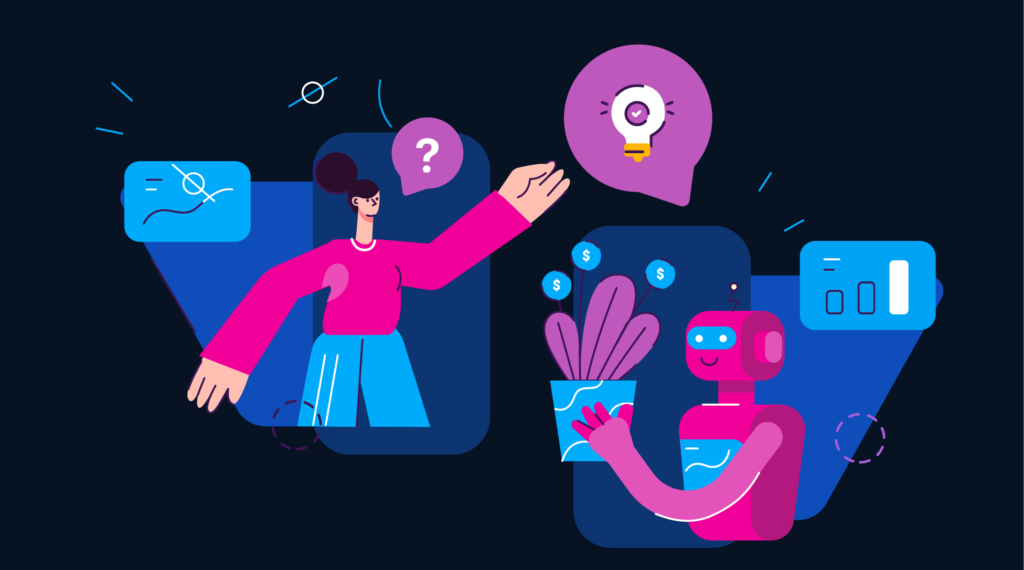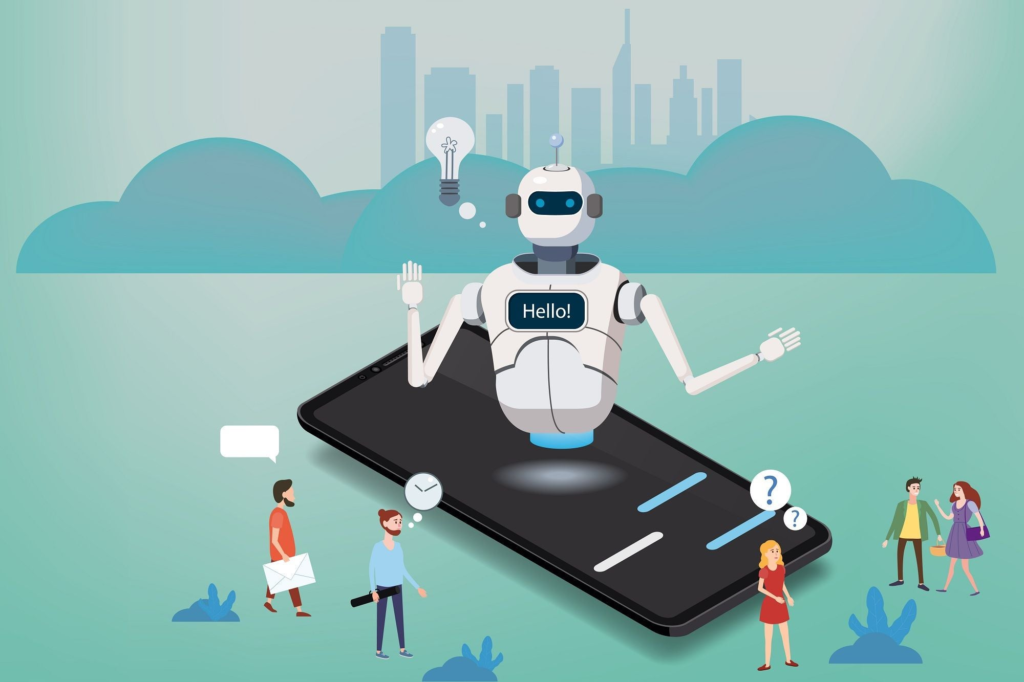AI-powered chatbots have had a significant impact on SEO (Search Engine Optimization) in several ways. SEO is the practice of optimizing websites to improve their visibility and ranking on search engine results pages (SERPs). Chatbots, powered by artificial intelligence, can influence SEO in both positive and negative ways:

- Improved User Experience (UX):
- Chatbots can enhance user experience by providing immediate responses to user queries, offering personalized recommendations, and guiding visitors through websites more efficiently. This leads to lower bounce rates, longer session durations, and increased user engagement, all of which are favorable signals to search engines.
Also Check The Synergy of UX Design and SEO 2023: A Winning Combination
- Lower Bounce Rates:
- When chatbots engage visitors and provide relevant information, it reduces bounce rates. Bounce rate is a metric that measures how quickly users leave a website after arriving. A lower bounce rate can indicate to search engines that your site offers valuable content and a good user experience.
- Increased Dwell Time:
- Chatbots can keep users on a website longer by providing real-time interactions and answers to their questions. Longer dwell times can positively impact SEO because they signal to search engines that your content is engaging and valuable.
- Keyword Optimization:
- Chatbots can analyze user queries and interactions to identify popular keywords and phrases. This data can be used to optimize content, meta tags, and other on-page SEO elements to better match the language and intent of your audience.
- Chatbots can analyze user queries and interactions to identify popular keywords and phrases. This data can be used to optimize content, meta tags, and other on-page SEO elements to better match the language and intent of your audience.

- Content Suggestions:
- AI-powered chatbots can suggest topics or content ideas based on user inquiries. This can help website owners create relevant and valuable content that aligns with user interests and search trends.
- Local SEO:
- Chatbots can assist with local SEO efforts by providing location-specific information to users, such as store hours, directions, or inventory availability. This is especially beneficial for businesses with physical locations.
- Voice Search Optimization:
- As voice search becomes more prevalent, chatbots can adapt to conversational queries and help websites optimize for voice search. Voice search queries tend to be longer and more conversational, and chatbots can provide insights into the kind of questions users are asking.
- Data Collection and Analytics:
- Chatbots can collect user data and feedback, which can be valuable for SEO analysis. Understanding user behavior and preferences can inform SEO strategies and content creation.
However, it’s important to note that chatbots can also have negative impacts on SEO if not implemented correctly:
- Overuse of Chatbots:
- Overloading a website with intrusive chatbots or poorly designed chatbot interactions can lead to a negative user experience, potentially increasing bounce rates and harming SEO.
- Content Duplication:
- If chatbots generate content that is duplicated across multiple pages, it can lead to duplicate content issues, which can negatively affect SEO rankings.
- Technical Issues:
- Poorly implemented chatbots can result in technical issues that slow down a website or cause errors, which can harm SEO performance.

- Natural Language Processing (NLP) for SEO:
- AI-powered chatbots leverage Natural Language Processing to understand and respond to user queries in a more human-like manner. This aligns with Google’s focus on understanding the context and intent behind search queries. As search engines increasingly favor content that matches user intent, chatbots can help websites create content that aligns better with user needs.
- Mobile Optimization:
- Many users access websites through mobile devices, and chatbots can be optimized for mobile platforms. This mobile-friendly experience can contribute to better SEO rankings because search engines prioritize mobile-friendly websites in their rankings.
- 24/7 Availability:
- Chatbots provide round-the-clock customer support and information access. This ensures that users can engage with your website at any time, which can lead to increased organic traffic and better SEO performance, especially if your competitors do not offer the same level of accessibility.
- Reduced Click Depth:
- Chatbots can quickly direct users to relevant pages or content, reducing the number of clicks required to find information. This can improve the overall site structure and make it easier for search engines to crawl and index your content, positively impacting SEO.

- User Feedback and Iteration:
- Chatbots can collect user feedback and identify pain points or areas for improvement on your website. By addressing these issues, you can create a better user experience, which can lead to higher rankings on search engine results pages.
- Rich Snippets and SERP Features:
- Chatbots can provide structured data and information that can be used to generate rich snippets in search results. Rich snippets, such as reviews, FAQs, and event listings, can increase click-through rates and enhance the visibility of your content on SERPs.
- Competitive Advantage:
- Implementing AI-powered chatbots early can give your website a competitive advantage. As more businesses adopt this technology, being an early adopter can help you establish authority in your niche and gain higher search rankings.
- However, it’s essential to monitor and analyze the performance of chatbots continually. Regularly review analytics data to ensure that chatbots are positively impacting user engagement and SEO metrics. Additionally, keep up with SEO best practices and search engine algorithm updates to adapt your chatbot strategies accordingly.

Conclusion
AI-powered chatbots have the potential to significantly impact SEO by improving user experience, optimizing content, and providing valuable insights. When implemented correctly and used to enhance user satisfaction, chatbots can contribute to higher search engine rankings and increased organic traffic to your website.
FAQ: The Impact of AI-Powered Chatbots on SEO
1. What is an AI-powered chatbot?
- An AI-powered chatbot is a computer program that uses artificial intelligence and natural language processing to engage in conversations with users. These chatbots can provide information, answer questions, and perform tasks autonomously.
2. How do AI-powered chatbots affect SEO?
- AI-powered chatbots can impact SEO in several ways. They can improve user experience, reduce bounce rates, increase dwell time, optimize content, and provide valuable data for SEO analysis.
3. How do chatbots improve user experience?
- Chatbots can enhance user experience by providing immediate responses to user queries, offering personalized recommendations, and guiding visitors through websites more efficiently. This leads to lower bounce rates and increased user engagement.
4. Can chatbots reduce bounce rates?
- Yes, chatbots can reduce bounce rates by engaging visitors and providing relevant information. A lower bounce rate is a positive signal to search engines, indicating that your site offers valuable content and a good user experience.
5. How do chatbots optimize content for SEO?
- Chatbots can analyze user queries and interactions to identify popular keywords and phrases. This data can be used to optimize content, meta tags, and other on-page SEO elements to better match user intent.
6. Are there any potential drawbacks to using chatbots for SEO?
- Yes, if chatbots are overused, poorly implemented, or generate duplicated content, they can harm SEO efforts. It’s important to implement chatbots thoughtfully and monitor their performance.
7. Can chatbots help with local SEO?
- Yes, chatbots can assist with local SEO efforts by providing location-specific information to users, such as store hours, directions, or inventory availability.
8. How do chatbots impact voice search optimization?
- Chatbots can adapt to conversational queries and help websites optimize for voice search. They can provide insights into the kind of questions users are asking, which is valuable for voice search optimization.
9. Are there any best practices for implementing chatbots for SEO?
- Some best practices include ensuring a seamless user experience, avoiding overuse of chatbots, monitoring user feedback, and regularly analyzing data to make improvements.
10. What should I consider when implementing chatbots for my website’s SEO strategy? – Consider your target audience, the type of content you provide, and the specific goals you have for your chatbot. Tailor the chatbot’s capabilities and interactions to align with your SEO objectives.
11. How can I measure the impact of chatbots on my website’s SEO? – You can measure the impact of chatbots on SEO by tracking metrics such as bounce rates, dwell time, click-through rates, and keyword performance. Additionally, monitor changes in organic traffic and rankings over time.
12. Is it important to stay updated on SEO trends when using chatbots? – Yes, it’s crucial to stay updated on SEO trends and search engine algorithm changes. Chatbot strategies should be adaptable to align with the latest SEO best practices.
This FAQ provides an overview of the impact of AI-powered chatbots on SEO and addresses common questions related to their implementation and benefits. If you have more specific questions or need further information, feel free to ask.

